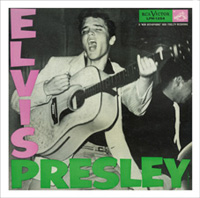Here are a few background comments from Kevan Budd, responsible for the great restoration and mastering of some of the latest Elvis' releases, regarding the Follow That Dream reissue of “Elvis Presley”. On message boards there was discussion on some issues, the FTD team also received several e-mails from fans, Kevan gives some background information on several of these issues.
Kevan Budd on: “I`m counting on you”, disc 2, the dry reverb tape...
This was an interesting find as this tape played at half speed and with parts playing backwards, I was unsure what this tape actually contained until it was repaired, well it turned out to be `I`m counting on you` with quite a different sound to the main tape with this one being dry (without echo) and limited to Elvis` microphone only (with some room bleed through from the other instruments), fortunately it also happened to include in part an unreleased take not on the other main reels that we had.
Kevan Budd on: the slap back echo...
This tape is also interesting for another reason, as it illustrates RCA using in part the same reverb method as Sam Phillips (slap back), where there would be a main machine recording the session along with any added effects to create the master sound. But to create a delay echo (slap back) they would send the live signal from the desired microphones (in this case just Elvis` microphone) to a second tape machine, record the signal on that second machine, the recorded signal will then play back a fraction of a second later through the same recording machines playback head. The short distance between the record head and the playback head plus the tape speed determine the length of the delay. This delayed signal is sent back to main mixing console which, when mixed back to the main live signal being recorded on the master tape machine, creates the slap back delayed effect. Though as we know RCA also added `live room` (stairwell) echo to these January 10th and 11th 1956 recordings, which of course created an overall effect that was unlike what Sam used on Elvis` recordings. In short what you will hear on this release is a direct recording from Elvis` microphone which was recorded on the second tape machine.
Kevan Budd on: the plane problem comments...
Another interesting piece of audio that we hope fans will enjoy was Elvis` plane ("glider") remark before `I want you, I need you, I love you`, take 14 as this is Elvis referring to his well known flight to Nashville to record `I want you, I need you, I love you`. The flight was plagued with problems including an engine cutting out and other problems, so it is interesting to hear a reaction from Elvis regarding
this event.
Kevan Budd on: the `Shake rattle and roll` master overdub, edit...
It was generally considered that the overdubbed master listed as take 12 was identical to the undubbed session take 12 with the only difference being the overdubbed backing vocals added for the master. It was therefore interesting to find an edit had been used on the chorus of the final master version along with the added vocal overdubs making it just a little more different than it was first thought to be.
Kevan Budd on: the dating of the Don Davis interviews Elvis Presley (acetate)
It is believed this interview was made around March, April or May 1956. At first it was thought the interview was much earlier but the non Elvis records played by Don Davis before and after the Elvis interview had been released after March 1956.
Kevan Budd On Elvis Presley (FTD Edition)
July 27, 2006 | Music
Related links
Tony C wrote on
July 27, 2006
I enjoyed this CD set very much, it was a real labour of love from the compilers. So much has been erased, which must make us fortunate to have what we do. I found the interview at the end very interesting, that was a great find. I look forward to a similar package devoted to Elvis' second LP, although even less seems to have survived from those sessions. Perhaps the folks at FTD will combine the existing recordings with something from the same era, one possibility would be the live Tupelo recordings if improved technology would allow better sound quality.

